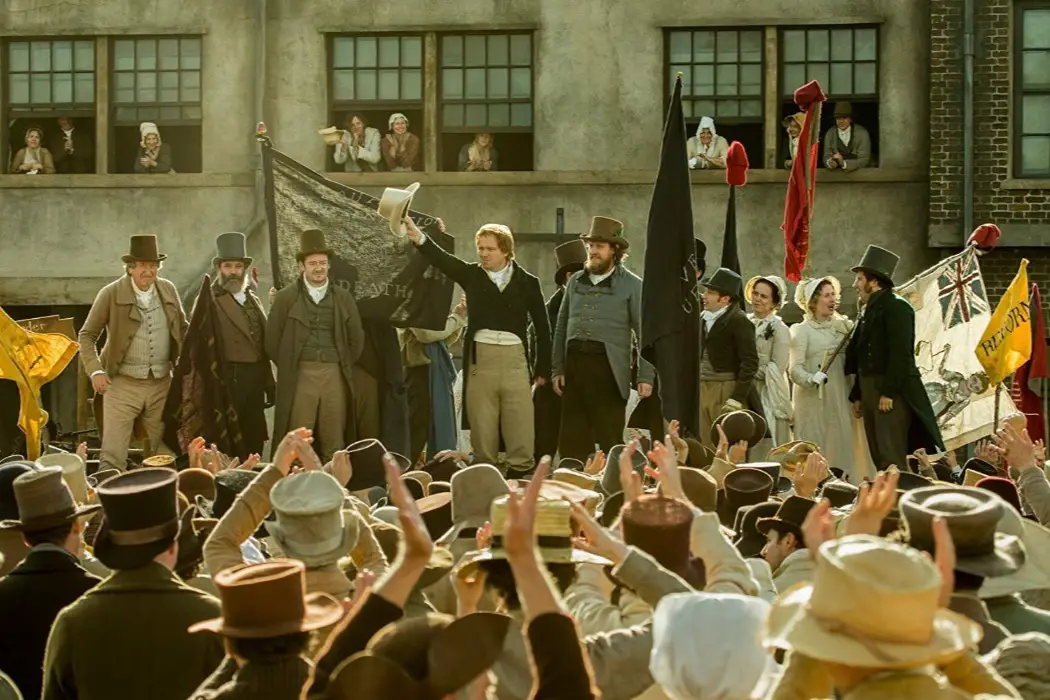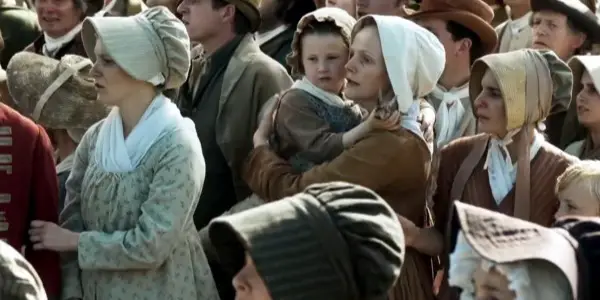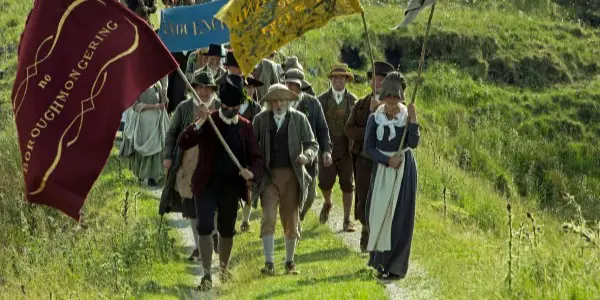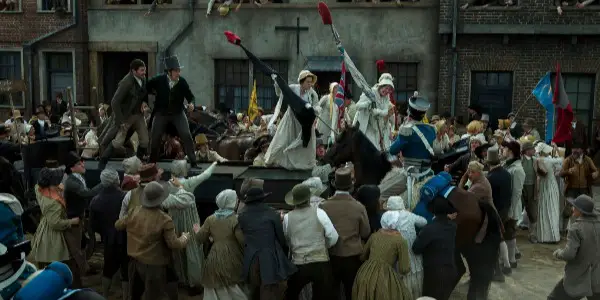PETERLOO: An Essential Depiction Of A Forgotten Tragedy

Alistair is a 25 year old writer based in Cambridge.…
Last year, casting directors put out a call for “authentic Northern faces” to appear as extras in Mike Leigh’s epic depiction of the St Peter’s Field Massacre, immortalised as Peterloo by press reporting on the tragedy. The legendary director looking to hire people who, as the job advert posited, looked “miserable, tired, overworked and a bit hard done by” might seem like the most extreme parody of British social realist filmmaking you could possibly expect.
It’s the sort of job advert that you’d expect to see printed as a satirical joke in an issue of Private Eye, making fun of whatever Ken Loach film was being released at the time. To see an advert sincerely hunting for miserable looking people to become film extras is so patently ridiculous, it could become hard to take the intended upsetting nature of the subject matter seriously as a result.
An Urgent Reminder of the Power of Democracy
Despite the horrific subject matter (which Leigh has spoken at length about being urgently needed to be taught in British schools), and the depiction of an oppressed working class being reduced to lives of poverty due to a non-democratic political system, the most striking thing about Peterloo is just how vibrant it feels. Leigh went on a three year sabbatical following his previous film, 2014’s Mr Turner, in order to intensively research the societal circumstances that led to the massacre in the most historically accurate manner. But this doesn’t feel like an exhausting, dense history lesson. Instead, it’s a righteously angry film still mad at the widespread injustices that denied the less fortunate their basic human rights, almost two centuries later.

It’s so thoroughly researched, it may take multiple viewings to fully grasp the extent of his depiction of working class British life in the early 19th Century – but Leigh’s passion for giving the victims of the tragedy a voice long denied to them shines through, and it proved impossible for me not to want to get lost in the immaculately realised historical detail. This isn’t a downtrodden, defeatist portrayal of the lower classes being killed by non democratic forces.
Instead, it’s a rallying cry for a less than populist, but nonetheless essential, cause; a call to arms telling us not to take our democratic systems for granted, and to ensure we use all our power to make sure Governments do their duty to serve in the interests of the people who elected them. Sadly, these themes remain as relevant today as they ever did.
In August 1819, 60,000 people gathered in Manchester, for a peaceful protest demanding democratic reform as the densely populated city had no elected parliamentary representative. With widespread poverty and food shortages, the people were angry – but after controversial southern speaker Henry Hunt (Rory Kinnear) was invited to speak, government representatives aimed to shut down the meeting. Their response was to send in militias that caused widespread casualties. Peterloo follows the speakers, families and journalists who were there on the day in the weeks leading up to the massacre.
One of the common complaints placed against Peterloo is that it coasts on the worthiness of the subject matter, not fixating on any particular character and becoming easy to not remember each individual within the sprawling ensemble. I agree with this to a certain extent; I would have loved to see Leigh turn this into a miniseries, so we can find out about the people involved outside of their involvement with the protest. But on the other hand, I’m not particularly convinced this matters – we may be separated by two centuries, but the dynamics of family life in northern England were recognisable to me, and helped me place myself within the drama.
A Distinctively Working Class Epic
Despite being an arthouse epic, it’s clear Leigh is pitching himself directly at the working classes of today, putting them in the shoes of the oppressed by offering simple character archetypes they can easily insert themselves into. The storytelling is simple, so we can understand the sheer gravity of the situation – and he doesn’t dumb down the historical context to afford this either. This leads to the other complaint levelled to the film, which is that too much time is devoted to impassioned speeches from the working classes, extolling the need for direct democracy for the entire populace and not just the privileged few.

But to claim that all these speakers are singing from the same hymn sheet is to miss the point entirely, as we get various complex opinions on these issues voiced across a vast ensemble resembling the northern working class of the era. One radical speaker argues Britain should follow the lead of the French and kill their unelected oppressors, an opinion that’s not exactly echoed by the majority. Similarly, the keynote speaker at the rally, Henry Hunt, aims to make his message of democratic reform markedly more conservative when speaking at the rally, out of fears of inciting violence with the full extent of his provocative message – other characters remark that in person, Hunt is a “bit bland”, and not the charismatic presence he is onstage because of this fact.
Mainly, the real triumph of Peterloo is that Leigh spends the bare minimum time necessary with the antagonistic higher classes in positions of power, giving us the required context but never letting them become the defining voices in the story. Sure, they remain comparatively one dimensional compared to the working class families, journalists and protestors to whom the film spends the majority of its time – but this isn’t a black and white issue, and it would be historically irresponsible to depict their actions with any semblance of ambiguity.
Mike Leigh is from a middle class background, and yet has spent his entire career documenting the trials and tribulations of the lower classes, and it has rarely felt as richly detailed as this. Even though these accents are all distinctly from the other side of the Pennines to this Yorkshire-born writer, I was still quietly moved just by hearing northern, working class voices speak in a naturalistic dialect, allowed to speak intelligently and passionately in a medium that all but silences the voices of the lower classes if they aren’t being made fun of.

It’s a shame that the rare occurrences of working class depiction within British cinema are all within tragic, social realist dramas – but the cry from the protestors at St Peter’s Field for politicians to represent the people can easily extend to filmmakers too. Cinema is the populist entertainment of the working masses. Ignore the voices of those who watch your films at your own peril.
Peterloo: Conclusion
There is much to commend Peterloo for, but in bringing to life a tragedy shamefully overlooked by the history books, Mike Leigh has made his most essential film since Vera Drake. This isn’t mere “poverty porn”, or a dry lecture – this is vital cinema, passionate in its belief in the power of the people to help bring about a better tomorrow. As history seems to repeat itself, with anti-democratic forces taking hold everywhere from Russia to Brazil, this tragic message from Manchester still feels relevant almost 200 years later.
It’s not a sexy message, or the sort of moral that will drive box office receipts, but it’s one that Leigh couldn’t have found a better time to remind us: don’t take democracy for granted. Defend it, and fight for reforms that will help everybody, no matter their social class or heritage, get their say at the ballot box.
Have you seen Peterloo yet? What was your take away from the film? Tell us your thoughts in the comments below!
Peterloo will be released in the UK on November 2, 2018 and in the US on April 5, 2019. All international release dates are here.
Does content like this matter to you?
Become a Member and support film journalism. Unlock access to all of Film Inquiry`s great articles. Join a community of like-minded readers who are passionate about cinema - get access to our private members Network, give back to independent filmmakers, and more.
Alistair is a 25 year old writer based in Cambridge. He has been writing about film since the start of 2014, and in addition to Film Inquiry, regularly contributes to Gay Essential and The Digital Fix, with additional bylines in Film Stories, the BFI and Vague Visages. Because of his work for Film Inquiry, he is a recognised member of GALECA, the Gay & Lesbian Entertainment Critics' Association.













